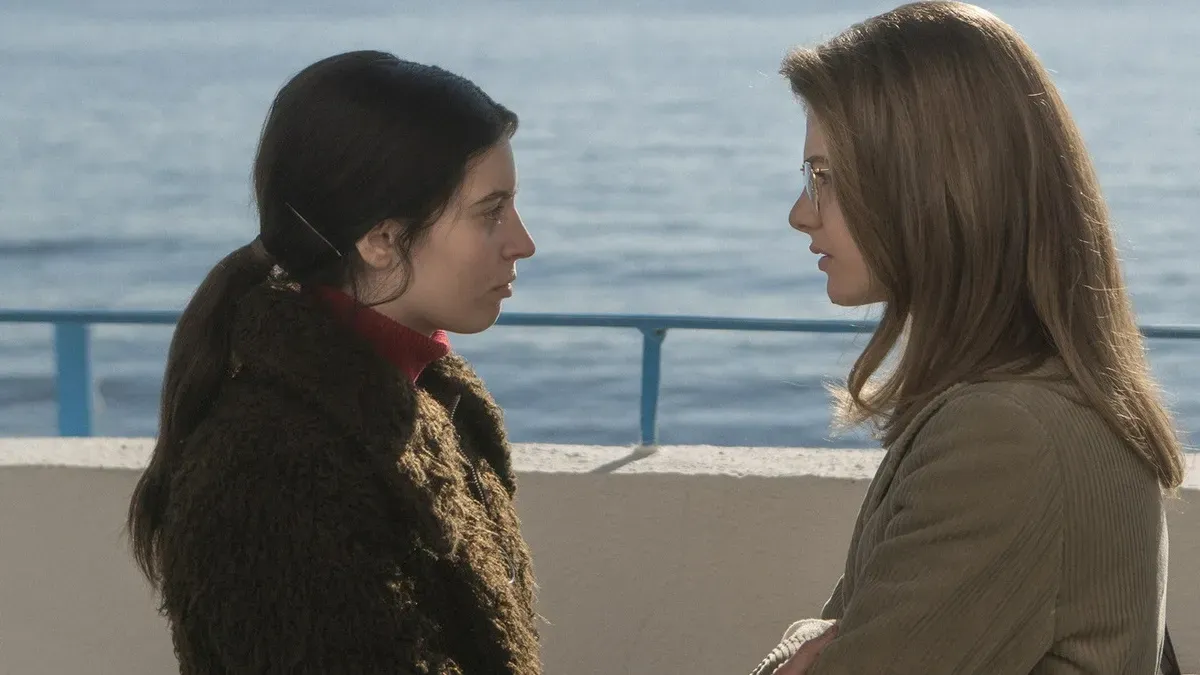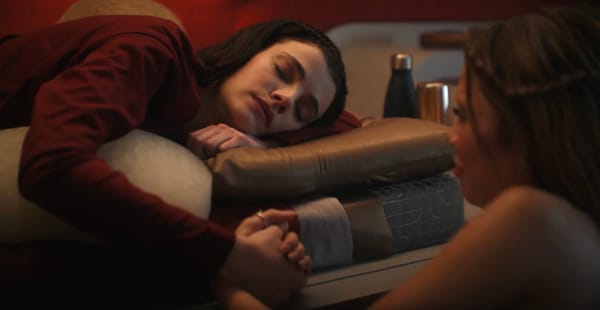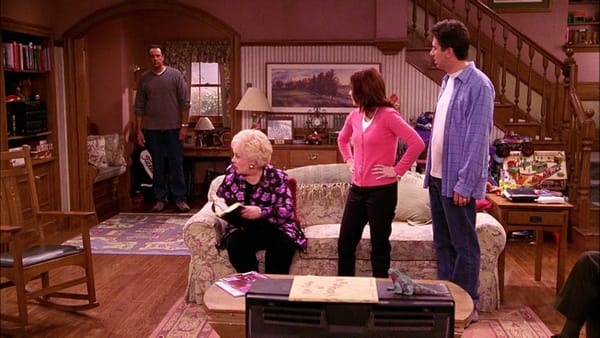Twists of fate and unshakable bonds: HBO's My Brilliant Friend
The network's adaptation of Elena Ferrante's beloved novels offers a gorgeous portrait of elemental friendship.

(Each week, I’m publishing a new pop culture essay from a freelancer. Remember: Your subscription fee helps me pay these freelancers for their efforts! This week: Michelle Swinea on the beautiful truths about friendship in HBO's My Brilliant Friend. If you thought you already read a version of this piece, that's because an editorial mistake led to an unfinished version of it being briefly published yesterday. Please enjoy the full post below!)

In HBO’s My Brilliant Friend, true friendship can withstand every trial and tribulation and last a lifetime.
Italian novelist Elena Ferrante’s four Neapolitan novels, published between 2011 and 2014 in Italian and 2012 and 2015 in English, are among the most acclaimed literature of the 21st century. The books lead readers through the beautifully complicated story of a steadfast and unbreakable friendship between two women throughout their formative years in mid-20th century Naples.
The show also forms the basis for My Brilliant Friend, which has adapted the series’ first three novels across its first three seasons. (A fourth and final season, adapting the last book, has been ordered.) Both the book and TV series provide masterful insight into how the bonds of friendship are forged, viewed through the eyes of main heroes Elena and Lila. The two friends find their lives shaped through the shared experiences of overcoming insurmountable adversity. Both the novels and the HBO show creatively and brilliantly depict how fully our humanity can change across our lives.
In the earliest moments of the first episode, an older Elena narrates her decision to write a memoir detailing her life-long friendship with Lila after the latter disappears. Then, the action shifts to 1950s Naples, where Elena and Lila meet as children. Neither comes from wealth. Elena's father is a porter, while Lila's is a shoemaker. Both girls' mothers work as homemakers.
Both girls do incredibly well in school, but Lila’s natural gifts and photographic memory make her seem like she might excel at every turn. Elena has to study and study, while Lila has to teach herself. Indeed, their friendship is initially sparked when a young Lila shows her teacher that she has already taught herself to read, impressing Elena.
Elena’s family supports her educational pursuits, but Lila’s genius threatens her father. He violently forbids her from attending school, literally throwing her out the window for wanting to pursue a high-school education. Despite her heartbreak at this turn of events, Lila is a fighter and works even harder. Moreover, some of her strengths help her father as well, as she finds herself a natural at the design and marketing of shoes, which helps her father’s business.
Elena’s household is not without violence, and she nearly ends up trapped by the same short horizons as Lila, despite her excellent grades. In a moment of reflection, Elena describes the normalized interpersonal violence that defined her childhood neighborhood. Community and domestic disputes provided a dysfunctional model for the children growing up there. Those children internalized the violence and brutalized each other in turn. The adult Elena, narrating, notes that the women fought much more frequently than the men in her neighborhood. Lila and Elena aim to break this cycle as children, vowing to use their intelligence, rather than brute force, to handle conflict and escape Napoli.
A supportive English teacher who believes in Elena’s writing talent persuades the girl’s father to let her obtain a college education. Lila envies Elena’s ability to go off to earn a college degree. But mostly, Lila resents her father for holding her back from sharing her brilliance with the world.

Even early in this story, My Brilliant Friend is underlining the ways that chance can drastically change the course of one's life. Elena has the support of an educator, her family, and her best friend. Lila only has her best friend. While they are both brilliant, Lila's lack of a support system limits her access to options Elena seizes with full force. Though the women won't realize how fully their paths have diverged until they are older, Lila catches glimpses of it here and there. She knows Elena has gained an advantage. She knows she might never catch up.
Lila is not the only one who is jealous. Where Lila is jealous of Elena’s educational opportunities, Elena envies Lila’s romantic life. While both young women are beautiful, Lila’s an “It” girl, a seemingly flawless beauty who ignites jealousy among her family and friends. Thanks to that beauty, Lila’s family tries to force her to marry Marcello, known for being as violent and ruthless as he is handsome and popular. But she won’t let herself succumb to such a horrid fate, so she readily accepts the proposal of Stefano instead. While Stefano struggles with showing his heart for Lila and has not healed from his trauma from being raised in an abusive environment, he represents the lesser of the two evils in Lila’s eyes. He also inherits a degree of wealth once his father passes, money he spends on Lila.
At Lila’s wedding, Elena finally lets spill how jealous she is. She doubts that her educational pursuits will fulfill her, but she continues anyway, hoping that her academic success will reward her professionally. For a time, it seems likely that romance will follow when Elena reunites with her childhood crush Nino on the island of Ischia, but their summer romantic bliss is destroyed by Nino’s father, Donato, who forces himself onto Elena, groping and kissing her. Repulsed, Elena finds it hard to be around Nino again when they return to school in the fall, but he helps her get an article published in a journal he writes for. However, Elena’s hopes for her professional and personal lives to find a twinned success are shattered when the journal doesn’t pick up the article. As the show’s first season ends, Elena wonders if she will ever be able to escape the poverty she was born into when neither her love nor work are regarded as valuable.
Dark portents end the season for Lila, too. After begging Stefano to keep Marcello away from the wedding, she is gutted to see Marcello enter the wedding wearing the shoes that Lila and her brother handcrafted and designed for Stefano. Lila slowly realizes, on her wedding day, no less, that she has entered into a loveless marriage with a man who disregards her wishes over his business endeavors.
This first season finale underlines both main ideas of My Brilliant Friend — chance and connection. The divergent fates of Elena and Lila are already spinning in different directions, thanks to a few small moments early in childhood. But both young women also realize how pivotal their connection is. Their friendship has expanded beyond schoolyard convenience, and the two provide an anchor for each other, no matter how rocky their familial or environmental circumstances become. They cannot find anything like their platonic love and respect for each other in their other relationships.
The series’ second season immediately follows the events of Lila’s wedding. Lila enters into a cold war with her husband after discovering his betrayal. She argues with him, pushes back against him, and turns down his sexual advances. Lila chose Stefano because she thought he would be kinder than Marcello, but she didn't account for how so many from her neighborhood were shaped by growing up amid its violence. Stefano responds to Lila’s behavior by physically lashing out at her, subjecting her to more abuse. Eventually, she suffers a miscarriage, thanks to Stefano’s endless abuse.
After a devastating breakup, Elena, nursing heartbreak, reconnects with Lila. Lila tells Elena about her miscarriage, her tough exterior shattering as she dissolves into sobs while her best friend holds her, their unshakable bond shining through yet again.

In hopes of giving her friend rest and meeting up with Nino again, Elena rents a beach house on Ischia and brings along Lila and her mother-in-law. Nino is, indeed, there on Ischia, and the friends spend days reminiscing about their old neighborhood while lounging on the beach. Elena’s desire for Nino is once again thwarted, but this time thanks to an affair he has with Lila. Elena, heartbroken, returns to her writing, but this time, she is rewarded, as she earns a scholarship to an elite university in Pisa.
Lila, however, learns she is pregnant and plans to leave her abusive husband to start a new life with Nino, who ultimately feels trapped and leaves her. With nowhere else to go, Lila returns to Stefano. Once her son, Gennaro, is born, she becomes determined to hold her family together for his sake. Stefano has other ideas, embarking upon an affair and ultimately choosing his mistress over his wife. He offers Lila an apartment, but she turns it down, finally spying a chance to be her own woman, away from the abusive men in her life.
The second season ends with Lila’s fierce move toward independence and Elena becoming engaged even as her first novel is published. Each young woman has grown to find herself, yet their bond as friends has continued to hold fast even as they've grown as individuals. For all they have changed, viewers can easily trace these versions of Lila and Elena to the spirited and brilliant girls we met in the show's first episode. They still yearn for love and acknowledgment of their gifts and talents at a time when they can be easily dismissed due to their gender. The brilliance of this story lies in how the series intertwines their separate journeys in a way that only reaffirms their bond as friends, even when they're not on screen together.
The two friends reconnect under sad circumstances in the show’s third season. Elena, now professionally and personally successful, with a published book and a handsome fiance, is devastated to learn that Lila has fallen ill. She rushes to Lila’s side, learning that Lila had been trying to start a union to combat sexual harassment and unsafe conditions at her job. It’s for naught. Elena helps nurse Lila back to health, then Lila quits her factory job to move back home to her old neighborhood.
But the third season holds one more reversal for these two friends. Elena’s husband becomes resentful of his wife’s success, while Lila gets a job leading a computer operations division, leading to professional fulfillment for the first time in her life. Now, it’s Elena’s turn to gaze at Lila’s life with jealousy as she longs for the independence her friend now boasts. And who should step into this chaotic time in Elena’s life but Nino, the man she’s been chasing all of her life. The third season ends on the question of whether Elena really will blow up her entire life – again! – for one more chance at making things work with Nino. (Of course she will. We know Elena well enough now to know that’s exactly what she will do.)
My Brilliant Friend teases out many different themes — cycles of abuse, feminist ideals, romantic hopes, etc. But its brilliance lies in how it roots all of them in its core, central notion of two friends whose bond can never be shaken, only growing stronger through each trial and tribulation. Through every struggle, through every new twist of fate, from grade school to middle age, Elena and Lila always find each other when they most need to. My Brilliant Friend never loses sight of the darker realities of the time and place in which it is set, but in Elena and Lila's bond, it provides something hopeful and bittersweet. Yes, the world can be awful, but it's a little less so with a friend.
Episodes is published twice per week. Mondays alternate between a free edition on various topics and a subscriber-supported edition where I recap TV shows of interest. Fridays offer pop culture thoughts from freelance writers. The Friday edition and the biweekly recaps are only available to subscribers. Suggest topics for future installments via email or on Twitter. Read more of my work at Vox.



